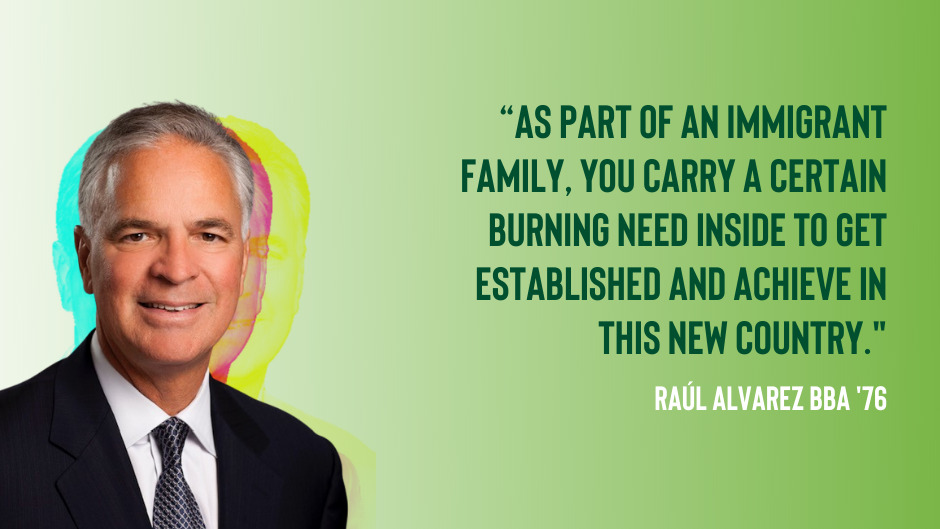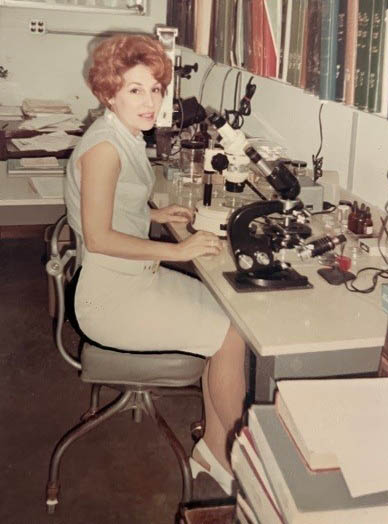Alumni Spotlight: former McDonald’s President and COO Raúl Alvarez shares the keys to his success
Cibeles Duran, 10-12-2021

From an early age, former McDonald’s President and COO Raúl Alvarez learned the importance of embracing opportunities and taking risks. His parents, who brought him (at just five years old) and his brother to Miami in 1961 after fleeing Fidel Castro’s communist Cuba, instilled in him a deep sense of drive to make the most of the family’s improved conditions.
“You have been given an opportunity in this country, don’t waste it,” he remembers their advice. “Don’t leave anything undone. Be the best that you can be.”
He reached the pinnacles of executive leadership in the fast-food industry by following their guidance.
In 1976, upon graduating from Miami Herbert in just three years with a bachelor’s in accounting and finance, he began his career as an auditor for what is today Deloitte Touche. Two years later, he joined the accounting team at Burger King Corporation, one of the largest employers in the city even at the time. Here, shortly into his new position, his boss gave him surprising advice.
“If you want to move up, you have to be on the sales side,” he recalls his boss’s words. “You have to stop counting the burgers and start selling the burgers.”
For Alvarez, the advice proved among the most important in his professional career. Once in sales, he discovered that he loved working directly with both customers and employees.
“Understanding how to motivate people either to buy your products as a customer or to perform better as an employee—understanding the psychology of humans—that is, for me, the most interesting part of the business world,” he says.
Thriving in his new environment, opportunities came quickly. At just 27, he accepted his first international assignment: heading the operations in Madrid, Spain. Suddenly, he found himself amid the more challenging but formative experiences of his career.
“I was running a $30 million business with no support structure around me,” he says. “I had to rely on curiosity, quick learning, and surrounding myself with talented people in disciplines that I didn’t have.”
The dedication paid off. A successful performance led him to London as head of the European operations, to Toronto as president of Burger King Canada, and eventually back to South Florida as the lead of the Florida division. In 1989, when Burger King was acquired by a parent company whose scope extended broadly beyond fast food, Alvarez considered it the right moment to leave the company. He accepted a position at Wendy’s, also as head of operations of the Florida division.
By 1994, he had made a name for himself, as he discovered when recruiters of industry leader McDonald’s Corporation approached him, an extraordinary move as they did not readily recruit outside of the company. For the next 15 years, Alvarez again accepted all opportunities and relocated as necessary to fulfill ascending leadership roles, which included running the northern California division, positioning Chipotle—at only 14 restaurants at the time of acquisition—for rapid growth, and leading operations for McDonald’s Mexico. Eventually, he returned to the United States as president and COO of country-wide operations, then of all North America, and finally, in 2006, of the entire global corporation, serving in this role until the end of 2009.
In 2010, he embarked on private equity ventures and participated in the purchase of Skylark Co. Ltd., the largest restaurant company in Japan with 3,500 locations and 100,000 employees. Living between the U.S. and Japan for five and a half years, he served as chairman and helped revitalize the company, taking it public just a few years after purchase. More recently, as a director on the board of Traeger Wood Pellet Grills and as chairman of First Watch Restaurants, he similarly helped steer both companies towards successful IPOs.
Alvarez attributes his accomplishments to a constant commitment to a high level of performance.
“As part of an immigrant family, you carry a certain burning need inside to get established and achieve in this new country,” he states. “My parents’ push to always strive for my best led me to take risks because opportunities were about working towards excellence and performance.”
Alvarez, who has been married for 42 years to his wife Gloria (also a Cuban immigrant), said his family shares the drive to excel, and the University of Miami has played an important role in that drive. His mother, a Ph.D.-level marine biologist in Cuba, found work as a researcher at the University upon arriving in the early 60s. Fourteen years later, she attained her master’s in the School of Education and moved on to fulfill her passion as a public school teacher. His son, Kyle Patrick, a 2005 UM graduate, followed the family tradition and became a third-generation ’Cane. His daughter, Kelly Marie, took a different route and is an alumna of the University of California San Diego. Moreover, Alvarez’s brother, University of Miami’s Professor of Physics Orlando Alvarez, has been a faculty member for 29 years.

Today, Alvarez visits the campus as a frequent guest speaker at Miami Herbert events. He advises students to take classes that build a solid foundation not only in the numbers side of business, but also in the psychology behind human behavior.
“If you are going to be in business, you have to understand how to motivate and reward people on both sides of the relationship, both customers and employees,” he emphasizes.
The influential Hispanic leader, who describes himself as “proud of my heritage and proud of this country,” also enjoys mentoring Hispanic employee groups in the companies where he serves on the boards of directors, including Lowe’s Companies and Eli Lilly and Company. In addition to stressing the importance of education, language skills, and the strengths of a multicultural background, he imparts the wisdom that most guided him: “Don’t be afraid to take risks,” he tells them, “especially when you’re young.”